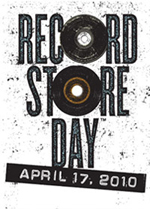The White Stripes “Under Great White Northern Lights” Third Man Records
- Performance:

- Sound:

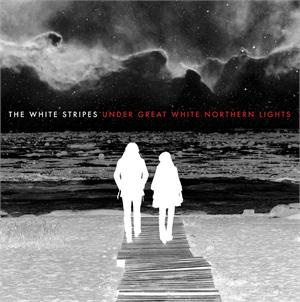
I get excited when Jack White throws his fans a bone. I’ve said it before. He’s our only real rock and roll superstar. There are other rockers out there, but most of us haven’t heard of them. When it comes to what’s popular on a mass scale, Jack White III is the only game in town. I’m terrified by the thought that he may never get back to his day job as the front half of the White Stripes. He seems pretty busy these days as the drummer for the Dead Weather or as Brendan Benson’s foil in the Raconteurs or palling around with Jimmy Page in “This Might Get Loud” or running his Third Man record label or producing Wanda Jackson’s latest release. . . you get the idea. The guy has a full slate. I had tickets to see the Stripes in Berkeley a couple of years ago, but the back half of the band developed an anxiety disorder which has prevented her from performing live since then to the best of my knowledge. And if that’s going to be the case, I suppose “Under Great White Northern Lights” will have to hold me over as the band’s only official, full length, live release (to the best of my knowledge). Big Jack’s a one-man show, and the gang’s all here: you get Howling Jack, Shredding Jack, Crying Jack, and Jumping Jack, among others. Meg does a serviceable job holding it all together from the drum kit, but she’s not in any danger of seizing center stage with her “little brother” around. She should take some comfort in that if she’s as wound up as I hear she is. Good luck with all that. Send me a letter when you get yourself together.
I’m most familiar with the White Stripes’ later work, and “Get Behind Me, Satan” and “Icky Thump” are pretty well represented on “Great White.” “Blue Orchid” and “Icky Thump” are especially searing while live mainstay “Jolene” shows why the group’s take on Dolly’s classic has proved so popular for so long. The dynamics in this band are pretty impressive considering their lack of members. On the other hand, maybe dynamics are the only thing to lean on in a band this lean. Whatever the case may be, the Stripes make better use of the quiet/loud dynamic than any group since Nirvana. White has the crowd with him throughout the acoustic “We Are Going To Be Friends.” You can hear them screaming and clapping and laughing and generally carrying on while Big Jack quietly plucks away on his acoustic and sings his ditty. He seems like the most unlikely of heroes at a time like this, but he’s followed his vision to the top of the heap. I don’t see anyone displacing him any time soon because I don’t think anyone has the roots that he has to base his success on. He’s also a blues man, in case you haven’t heard, and his influences run much deeper than the over-dramatic ’90’s schmaltz that has survived so much longer than I’d hoped it would which was long enough to influence a whole other wave of imitators. The whole movement will choke on itself soon enough, I hope, but that might be too optimistic. That’s what makes Big Jack so important. Someone has to toe the line. I appreciate his enthusiasm and his work ethic. I just hope it’s enough.
Basically, “Under Great White Northern Lights” has about everything you’d expect as a White Stripes fan. The vibe is fierce and sweaty. The songs are dynamic and powerful. The band’s playing is loose and ragged, and right. Big Jack’s tone is enough to strike fear in the enemy’s heart, and I hope it does. If anyone is going to vanquish the Lameness of Current Rock Radio, it’s going to have to be Jack. And his most powerful incarnation is still as the front man in the White Stripes. His other endeavors are better than most, but this is where the feeling lives. He’d have gotten to where he is one way or the other, but I’m glad he did it as a Stripe. He’s had the most unlikely radio hits of the last decade whether they’ve been as classic country tear jerkers or as dissonant noise-based experiments. There’s a live video document of “Great White,” and I’m waiting on my copy of the Blu-Ray version as we speak. It occurred to me that I may have gone a little over board with the vinyl if I’m also getting the Blu-Ray. That’s a pretty special digital medium, and the sound is most likely comparable between the two, but I’m happy to support the Stripes and the vinyl revolution anyway. I’d like to recruit you for Big Jack White’s “Seven Nation Army” too. Our numbers will swell and we’ll take back the future of rock and roll. Or give it a future. However you want to look at it. . .
Horace Silver and the Jazz Messengers “Horace Silver and the Jazz Messengers” Classic Records / Blue Note
- Performance:

- Sound:

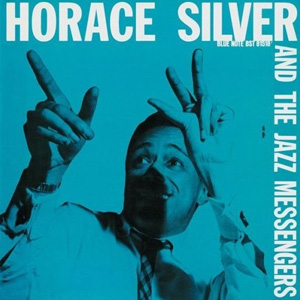
At this point, it’s hard for me to choose which Classic Records jazz title to explore next. I landed on “Horace Silver and the Jazz Messengers” from 1955 in March. I’m learning that most of the jazz albums that I’ve enjoyed to this point are considered “hard bop,” and the Jazz Messengers’ first one is supposed to have helped established the genre. Who knows? All I know is that this one features both Hank Mobley and Kenny Dorham, and that Horace Silver is alleged to be a hotshot pianist with some crazy style of his own. As usual, the sound is superb. The revelations are hiding in the performances. They’re not too hard to spot either, trust me. It’s tough to see why Silver was credited as the band leader based on his participation on this record. I don’t want to diminish his contributions. They are as essential as anyone else’s, but much of the limelight is centered on Mobley and Dorham. They seem to handle the bulk of the themes. Art Blakey’s drum parts are featured too, and he used the Jazz Messengers name for the rest of his career so I don’t know how they decided whose name to tag on to this release. This is a true group effort. Their Message comes through loud and clear. Or soft and clear, depending on the song.
Kenny Dorham’s trumpet blows the doors off of “Room 608” right off the bat. It’s an uptight number and Dorham splatters the canvas with a couple of solos that’ll curl your toes. You get a break relatively early on during the slower, soulful “Creepin’ In.” It’s already crept into my subconscious as I feel like I’ve been hearing it for years. There’s a bit of a Pink Panther vibe here which I recently noted on Mobley’s “Roll Call” too. Maybe that’s his thing, but it’s more likely that I’m limited in my abilities to describe what I’m hearing. Regardless, “Creepin’ In” is a groovy bit of soul that sticks with you, man. (You have to wear a beret, drink coffee, and smoke cigarettes from one of those long holder things if you’re gonna talk like that. I don’t have the stones to go through with it. Send me your pictures if you do, along with a catalog of your jazz collection. Thanks.) Silver takes his first mind-warping solo on “Stop Time.” It’s enough to break your neck, and gives you all you want without being flashy. Everyone gets a little space on this one, but I think Silver does the most with his. “To Whom It May Concern” closes out the first side with some Latin flare, and some nifty ensemble work before Silver goes off again. By now, the listener is at the musicians’ disposal. This is the work of masters, and the very thought of turning this one over is enough to make you anxious. “Hippy” kicks off side two with a quick dialogue from Blakey’s drums. I don’t know what the word “hippy” meant to folks in 1955, but I think it’s ironic that the song relies so heavily on Blakey’s percussion. Right up any hippie’s alley, I guess. “The Preacher” swings with a New Orleans style conjuring images of jazz funerals and Mardis Gras. It doesn’t sound particularly pious to me, but I never went to church anyway. I might not be the one to ask. Mobley takes the cake for me on “Preacher,” and his “Hankerin'” doesn’t let up from there. It’s a smoker, the guy’s a legend, I can’t figure out why I don’t hear more about him. I must be talking to the wrong folks. “Doodlin'” wraps it up in a tight little bow just in time for the listener to gather his or her wits and give it another spin. It’s too quick, and you’ll want more if you’re anything like me.
I think the only thing to do after hearing “Horace Silver and the Jazz Messengers” is to dig into Art Blakey and the Jazz Messengers’ “Moanin'” in April. He’s the only holdover from the first record, and it’s supposed to be a winner too. “Moanin'” comes recommended to me by a friend that read my Mobley review. He thinks I’ll really like it. I think I will too if it’s at all like the Silver record. I’m beset with a limiting belief system which insists that artists prove their worth to me after their best work. In short, I typically doubt an artist’s ability to repeat their brilliance. I’m not betting against this roster though. Not by a long shot. Classic Records has opened the door to an alternate universe for me. It’s been there forever, I just haven’t known where to look. They’ve taken the guess work out of it for me so far. I’m hearing that they’re going out of business which would be a major blow to my plans for the future. I got an email from their marketing department last week attempting to allay my fears. They say they’re staying. I hope they’re telling the truth. I’d pick up a copy of “Horace Silver and the Jazz Messengers” if I were you, just to be safe. You’ll be glad you did one way or the other.
Centro-matic / South San Gabriel “Dual Hawks” Misra Records
- Performance:

- Sound:

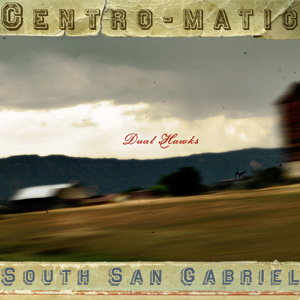
I put off listening to Centro-matic for years after they initially came to my attention. This was not on purpose; it was just the way things shook down. Patterson Hood has always been their biggest supporter, and I always perk up at year’s end when he puts out his annual “best of” list. Centro-matic seems to always make the cut if they’ve released anything in the preceding months. He used some of their core members on “Murdering Oscar” and on last year’s solo tour too. I caught the San Francisco show and was dutifully impressed by Will Johnson’s playing and his vocals so I thought it was the perfect time to delve into his band’s oeuvre. I started with their most recent, “Dual Hawks.” It was released in 2008, and it’s actually a split release with Centro-matic’s quieter alter-ego, South San Gabriel. The latter band is made up of Centro-matic’s members with others on pedal steel, strings, and horns. The larger band makes the quieter sound, and both are stellar. “Dual Hawks” contains music for most every mood, and I’m happy to hear it most any time. I haven’t exactly worn the grooves down on “Dual Hawks” yet, but I can feel it slowly burning its way into my rotation. I’ll get a lot of miles out of this record, and I’ll have both bands on my radar from this point forward.
Centro-matic’s “Dual Hawks” starts hot with the distorted and melodic “The Rat Patrol and DJs.” It’s textured and dense, and calls to mind any number of your favorite “Americana” roots-rock bands. But all of these labels only became necessary when true rock and roll went the way of the dinosaur, and that’s mostly what this Centro-matic record is made of. True rock and roll! Man, it’s nice to find you at a time like this. Don’t allow me to mislead you, there’s plenty of experimentation happening in these songs. Interesting sounds and structures with unexpected harmonies that never take the listener away from the meat of what’s happening. And what’s happening is down home rocking with some softening agents thrown in for the rougher edges. There are hand claps and high, sweet harmonies to counterbalance the electric guitar crunch and the dense drum work. “Remind Us Alive” is the first tune on “Dual Hawks” that imbeds itself in your psyche. It’s a little simpler than the first couple of songs from a structural standpoint with a memorable vocal line, and all the attitude you need. I’d be stoked to hear this song loud and clear on a sunny Saturday drive up the coast with the ocean on my left and a cooler in my trunk. Any stretch of open country would work too if you don’t have access to the sea. It’ll be a nice addition to any summer play list, really, but it’s especially useful when driving. That’s my take on Centro-matic’s “Dual Hawks,” anyway. It’s an awesome summer driving record. Use it or lose it.
South San Gabriel’s “Dual Hawks” is a horse of another color. You might get a little more use out of this one the day after polishing off the cooler that had been so full of promise on yesterday’s drive. It’s quieter with more acoustic instrumentation. The vocals are less aggressive and the textures are more soothing. The melodies seem to come more from the instruments than the vocals, and the whole program seems more relaxed. It’s really beautiful, and perfectly balanced. I’d compare it to a fine glass of wine if I knew anything about wine. I’d say “Dual Hawks” is a fine introduction to Will Johnson’s work with his two bands. It’s been quite surprising and a lot of fun for me. I’ll probably pick up another record by South San Gabriel before expanding on Centro-matic, but that’s not to say that I like SSG better. It just fits more with my current quiet mood. I’ll feel like rocking again soon enough, and I’ll have Centro-matic in my sites when I do. Until then, summer’s on the way, and I’d recommend that you have a copy of “Dual Hawks” handy when it gets here. The vinyl version comes with a download coupon too so you might as well pick it up on wax while you can. I’m glad I did.
Nat “King” Cole “Penthouse Serenade” Pure Pleasure Analogue
- Performance:

- Sound:

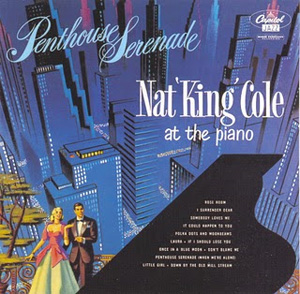
I’m a sucker for a good pianist. I don’t get enough of it on modern recordings, and a good performance on keys always jumps out at me off of my old favorites. Something told me that Nat “King” Cole was probably a pretty formidable practitioner of the art, and something was right. I grabbed “Penthouse Serenade” when I saw that it was on Pure Pleasure Records, and that it was comprised mostly of instrumentals. I’d heard that Cole had his image as a balladeer and crooner foisted upon him by his managers, and that he’d have preferred to just play keys. I’ve not dug too deeply into his personal history, but it makes sense to me. I can imagine it happening just that way so I was interested in hearing what the guy could do in his element as a keyboardist. The results were more satisfying than I’d expected. Enough so that I gifted this album to my father via iTunes for his birthday after hearing it a couple of times on vinyl. He may not have gotten the sonic experience that I’m getting right now, but he got the idea. These are some of the most comforting performances that I have by any artist in my collection. They swing when they’re not whispering, and I’ve had a hard time listening too much else for a little while now.
Cole is accompanied on “Penthouse Serenade” by a guitarist, bassist, and drummer with some unobtrusive percussion work thrown in on a couple of songs. This scaled down band gives the listener every opportunity to hone in on Cole’s playing and the payoff is immense. It’s the perfect way to hear him play. I don’t miss hearing the orchestral arrangements that he is most famous for at all. His piano is front and center in the mix and the sound on this release is tough to beat. Steve Hoffman and Kevin Gray re-mastered this version and it sounds like gold. I don’t know how else to say it. The instrumentation is as clear as you could hope for, and it’s such a relief to hear this flawless sound without the modern contrivances that make today’s recording’s so lame. I imagine these records were comparatively easy to make, and I only wish that we approached today’s recordings with the same simple plan. No one likes an electric guitar more than me, but having the chance to hear these gorgeous acoustic instruments on such an intimate recording is one of life’s greatest pleasures. I have a feeling there is more of a market for this type of thing than most people realize. I’m thinking of Nora Jones’ success as an example. Maybe it would take someone at her level of popularity to publicly recognize these types of recordings before her fans could comfortably jump on board, but if you like her music, you’d like “Penthouse Serenade.” I don’t see it happening any other way.
Some records make you want to drink and raise Cain. Some make you want to slip into a hot bath and stay there for the evening. Some make you want to rock out and play air guitar (“fantasy guitar,” as C.J., our Marketing Director, likes to say). “Penthouse Serenade” makes me want to sit in my leather chair with my feet on the ottoman, shut my eyes, and listen. Cole’s playing is so musical and fluid, and the sound on this record is so good, anything other than an active listen seems wasteful. My dad is surprised that I am as taken with this record as I am. In fact, it’s right up my alley. There are a few vocal turns towards the end (including “Unforgettable”), but the real fun is in the instrumentals. If you like masterful playing and perfect sound, then the recent Pure Pleasure Records release of Nat “King” Cole’s “Penthouse Serenade” is for you. If you’re not into any of those things, then how did you land on this page, huh?
Vetiver “Thing of the Past” Gnomonsong
- Performance:

- Sound:

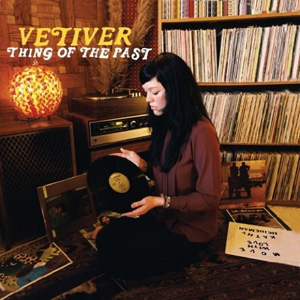
Some friends of mine from home recommended Vetiver to me last month. One album in particular, “Thing of the Past,” seems to have impressed itself upon them in a serious way. I’d like to say that I’m open to most any new music that’s out there, but that would be a lie. I am, in fact, very often the opposite of open to new rock music specifically. But these guys know what they’re talking about and “Thing of the Past” is a fine record by a local San Francisco outfit that I know next to nothing about. “Thing of the Past” is Vetiver’s third full-length album, and it’s comprised exclusively of cover songs. It’s not their most recent, and I don’t know how representative it is of the band’s sound, but it’s the perfect record for a foggy Friday afternoon which is quite common in this neck of the woods. Some online research shows that Vetiver is considered by many to be an electric folk band. Whatever. “Thing of the Past” is a quiet rock record, but we can call it “folk” if it helps the band cultivate the image they’re most comfortable with or if it provides an accessible label to their current and potential fan base.
So, in that light, an album of covers makes perfect sense, right? Folk songs are traditionally handed down from artist to artist, and eventually become part of that genre’s landscape. That’s not to say that Vetiver chose a bunch of Woody Guthrie songs to re-hash here. This band is drawing from a pretty deep well, and I recognized the names of a few of their heroes, but not most of them. I’m somewhat familiar with Garland Jeffreys (Vetiver takes on his “Lon Chaney”) from “Little Steven’s Underground Garage” which leads me to pick up Jeffreys’ “Ghost Writer” a while back. Townes Van Zandt is represented by Vetiver’s take on his “Standin’.” I’m at least aware of Loudon Wainwright III, but haven’t dug in to his catalog yet. And everyone knows Norman Greenbaum whether they realize it or not. (Vetiver does not tackle “Spirit In The Sky,” they wisely chose another one.) Things get pretty dark for me after that. I’ve never heard of any of the other artists on “Thing of the Past” which impresses the fun out of me. I’m not fool enough to think that I’ve got the complete history of rock and roll rattling around in my head, but I’m usually pretty familiar with most of what’s thrown at me. I became aware of some pretty left-of-center artists at an abnormally early age thanks to my best friend’s older brothers, but Elyse Weinberg, Derroll Adams, and Dia Joyce are names that escaped me until I discovered Vetiver. I’ll get around to researching these folks soon enough, but until then I’ll fall back on the old critics’ stand-by: comparing Vetiver to other bands that I am familiar with. It’s kinda lame, and completely over done, but it’s all I’ve got. So I’d say that Andy Cabic’s vocal delivery reminds me a bit of the Velvet Underground’s more relaxed work while the music falls somewhere in line with 1970’s California psychedelic country-rock. The band Relatively Clean Rivers comes to mind, but that would be like referencing Michael Hurley or Paul Conrad Rose III, both of whom are represented on “Thing of the Past,” neither of which are exactly household names.
I’m going to get a fair amount of play from this one. It’s an album that grows on you very quickly starting with the first listen. There might not be anything that blows your mind here, but it’s a well put together record with clear instrumentation and uncorrupted performances. No auto-tuners here, thanks, and no cameos by better known artists to help get the message out. At least, none that are credited. The vinyl’s nothing to turn back flips over, but it’s serviceable with minimal surface noise and a decent pressing. The album artwork depicts a young lady putting a record on the old hi-fi which may or may not have been manufactured by Silvertone. The visual fits the vibe which is totally retro from start to finish. We’re not pushing the musical envelope here. We seem to simply be offering a pretty good take on some admired old recordings. That’s enough for me at a time like this. And it’ll probably be enough for me to dig a little more deeply into Vetiver’s catalog or to get me down to the local music hall when they come through next. I call that progress.


